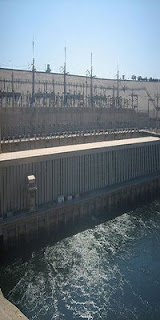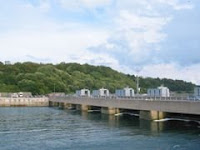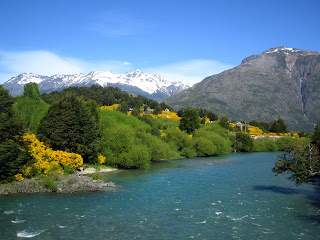terça-feira, 2 de dezembro de 2008
Hydropower on Rivers

The electricity is produced using the potential energy of dammed water. The water forces a turbine to rotate. The turbine is linked to an electric generator, where the electricity is generated.
Depending on how much potential energy the water has, the generated power is higher or minor, and the potential energy is proportional to the height/head.
There is a simple formula that let us calculate an approximate value of the generated power by a dam in a river:
‘P=h.r.g.k’.
‘P’ is the power (Kilowatts); ‘h’ is the height (meters); ‘r’ is the flow rate of the water (cubic meters per second); ‘g’ is the gravity acceleration (9.8m/s2); ‘k’ is the coefficient of efficiency which varies between 0 and 1. Usually that coefficient is higher when the turbines are bigger and modern.
As I already said in other post, exploring this energy has 2 main types of costs: money and the change of nearby habitats.
Sources:
http://en.wikipedia.org/wiki/Hydroelectricity
http://www.youtube.com/watch?v=htT_8sFJx1w
Renewable Energies

Global population should decrease their energetic consume and try always improve, using technologies that help the humanity become less dependent on fossil fuels.
Environmental debates should be discussed between the politicians in order to teach how to save energy and alert people for the dangers that our Planet´s health is dealing.
Biogas

The fermentation or the anaerobic digestion of biodegradable materials produces this gas. It’s formed primarily by Methane and Carbon Dioxide.
There is another type of biogas named wood gas. It’s created by the process of gasification of wood. It’s composed mainly by Nitrogen, Hydrogen and Carbon Monoxide, and it has traces of Methane.
Hydrogen, Carbon Dioxide and Methane can be oxidized or combusted when exposed to Oxygen.
Depending on how it’s produced it may cause more or less pollution.
Biogas is usually used for heating purposes, such as cooking. It can also be used to power car engines.
What I think: There are probably other better choices to power car engines, but it’s better to use biogas than depending on fossil fuels like petroleum.
Sources:
http://en.wikipedia.org/wiki/Biogas
Biomass
The most common biomass resource is the wood.
This source of energy has a lot of negative impacts to the environment (Atmospheric pollution / Dangerous to the Ozone layer).
The plants store some Carbon because of the photosynthesis process (the Carbon stored in dry wood is around 50% of the wood weight). When the plant dies or is burned, the Carbon is released with Oxygen to the Atmosphere as CO2.
It might be a renewable energy, but I think we’d better use the wind power or other renewable energy source that is friend of the environment.
Combustion of wood, an example of the use of biomass energies.
Sources:
http://en.wikipedia.org/wiki/Biomass
RODRIGUES, Maria, DIAS, Fernando, Física na Nossa Vida, Porto Editora, 2007
segunda-feira, 1 de dezembro de 2008
Tidal Power
Tidal power is classified as a renewable energy source because it’s generated by the gravity interactions between Earth, Moon and Sun.
The Earth-Moon system is losing mechanical energy because of the tides. Because of this loss of energy, in the last 620 million years the rotation period of Earth has increased from 22 to 24 hours.
Tidal power can be converted into electricity using:
- Tidal stream generators;
- Barrages.
Tidal Stream Generators
This technology transforms the energy from the currents (kinetic energy) like the wind turbines do.
Now you’re probably thinking: ‘But the speed of water is around one-tenth of the wind speed!’ Yes, that’s true. But the water density is around 830 times the density of air, so a system of turbine of the same size may produce the same power.
Barrage Tidal Power
Barrages, placed into estuaries, use the difference of height (potential energy) between low and high tides.
This way to produce electricity involves more costs, can only be used in some sites and may cause some environmental issues. Those environmental issues are related to the reduction of the saltwater flow, what make changes to the estuary as a habitat.
Sources:
http://en.wikipedia.org/wiki/Tidal_power
http://www.youtube.com/watch?v=tSBACzRE3Gw
Main Advantages/Disadvantages of Renewable Energies

Solar power:

Wind power:
The wind is an inexhaustible and very economic-efficient source of energy. It is harmless to the environment, although it produces noise pollution. It can only produce an efficient amount of electricity if the wind has a velocity of 6 m/s.

Hydro power:
That energy is produced by dams and it is expensive to explore. It doesn’t pollute the environment, but it makes some changes to the environment that may be harmful to the living beings that habit there.

Tidal power:
That source of energy isn’t widely used yet. The energy of the tides is used to produce electricity. It’s harmless to the environment, but it’s very expensive, and it can only be explored in some places.

Wave power:
Pelamis devices use the energy of waves to produce electricity. As the tidal power, this source of energy isn’t widely used yet, it’s very expensive and it can only be explored in some places. The world's first commercial wave farm is based in Portugal.
Now you ask me what I think about this. My answer is:
Use them all where it's possible!
Sources:
http://en.wikipedia.org/wiki/Renewable_energy
http://en.wikipedia.org/wiki/Hydroelectricity
http://en.wikipedia.org/wiki/Solar_energy
http://en.wikipedia.org/wiki/Tidal_power
http://en.wikipedia.org/wiki/Wave_power
http://en.wikipedia.org/wiki/Wind_power
RODRIGUES, Maria, DIAS, Fernando, Física na Nossa Vida, Porto Editora, 2007
domingo, 30 de novembro de 2008
The future is in our.... feet!
(for more info, watch this http://www.sustainabledanceclub.com/)
'Come on, don't joke with me' you may say.
When you turn on a lighter, those that you just need to press the button, it produces a spark. Do you know how is that spark produced? By pressing a piezoelectric crystal. Those materials when under pressure produce small amounts of electric energy. I am talking about this topic because I saw a documentary on the TV talking about this. Do you know that if a person walks for 1 hour on a piezoelectric floor it would produce about 50 watts? ‘Not much’, you may say, and you are right. But think in an airport or in a shopping mall or even in a train station. Can you imagine the amount of energy that could be saved by just changing the floor tiles?
Taking these numbers to an extreme: if all humans, 6 billions, where eventually walking for 1 hour every day in those tiles, it would be produced 300GW of electricity!
That is what we need to do: little changes. Those are the ones which have the greatest impact in our environment. If we do a lot of little changes, we are actually making big changes!
Remember; 1 Euro is made out of of 100 cents!
sábado, 29 de novembro de 2008
Wave Energy
It is expected that the energetic consume will rise on the next decades. To prevent that, the governments from all around the globe have been warned to the fact that the traditional ways to produce energy are causing environmental problems and they need to change to renewable ones. The energetic sector has been forced to reconstruct the process, which means the sector will have to use renewable energies.
In industry, the renewable energies evolution is emerging. The wave Technology is new and it´s not economically competitive with other elder technologies like the wind power, although governments and industries interest in this field is growing because the waves have the bigger amount of energy of all the other renewable resources.
Just imagine the huge amount of energy those waves have. Even professional surfers can´t handle them (this video is not for sensitive eyes):
EnViRoNmEnTaL IsSuEs

The scientific and technologic advance of our society have provoked a rapid raise of the global energetic consume.
Mankind has used fossil energies irrationally because on their daily life they consume high amounts of energy without thinking on the consequences that their actions are having on the environment.
The world energetic supply still depends about 95% on fossil fuels, which means that every day high amounts of toxic and greenhouse gases are sent to the atmosphere. One of the main consequences of these gases is the raise of the global temperature on our Planet. Besides that, nitrogen and sulfur send to the atmosphere by industries every day, react with the evaporated water, producing acid rain. This atmospheric contamination is toxic for all the living beings and pollutes the water of rivers and lakes.
The increase of fossil energies consume will conduct to their extinction. That´s why the humanity should have conscience of the energetic crises and use other resources to minimize the environmental impacts.
quinta-feira, 27 de novembro de 2008
CO2 Gas Emissions

Since the Earth formed, more than 4600 million years before, climate has had a few changes. Although, on the last century, those changes have been growing, overtaking the line of natural.
The climate changes are nothing more, nothing less than a consequence of the human activity on the natural world. With effect, since the industrial revolution the human activity raised on 25% the amount of carbon dioxide present on the atmosphere. The burning of fossil energies and deforestation are the primary suspects of this raising.
Our Precious Planet

We need energy for heating, food, transports, construction and production. Energy is essential for all our daily routine and for our economy. Although, ambient impacts derived from the high energy consume and production are really worrying.
The actions of the consumers are determinant to save energy. The rational use of energy should begin where the cost is more effective. It is important to improve the information about the environment because people should know what is happening to our Planet. It is on our hands save the natural resources and protect the world.
Brumm Brummm!!
Watch this video:
Interesting hum??
Indubitably, this is the future, but now... well... it's very expensive and challenging to have one of these.
One of the biggest problems we are facing when trying to use a car like this, is the few amount of fuel stations which provide hydrogen! This is even a bigger problem when considering this car has more or less a 400 km autonomy.
To this problem I have a simple solution. Populations are mostly distributed by the coastline so:
I don't know how accurate are those numbers but lets imagine that 10% of all fuel stations are close to the sea, a big river or a lake.(I think there are more than 10% but let's don't oversize the numbers). If those stations where connected by water distribution pipelines, and where provided by High-efficiency solar and wind generators, they could be the hydrogen producers! Advantages of this? Low cost! If we could produce our fuel, where we sell it, we won't add the transportation cost to the cost of the fuel! Perfect!
And more, in order to waste less water, each station would also be a sewage treatment station, so it would preferably use water which would never be used to drink or to water crop fields.
10% doesn't seem too much, but it would help the hydrogen cell vehicles proliferation!
domingo, 23 de novembro de 2008
Let the Sun guide you!
Let’s travel some years in the past. Where are we? I give you a clue; pyramids and sand. Yes Ancient Egypt. From all the religions, I really do think theirs was the one that made more sense, since ever. Their gods were personifications of various nature´s aspects, and their mythology was based on natural events. One of the deities they worshiped was Ra, the Sun god (actually the sky god (Horus) was also considered Sun god).
Why would they worship the Sun that burned their backs while building the mighty pyramids?
The answer: they were a smart civilization, and they knew the Sun was their main source of energy. They also worshiped some Nile river deities such as Hapy and Osiris.
Hum… water and sun… does this remembers you anything?
On my first post I talked about electrolysis, a method to break water molecules into hydrogen and oxygen atoms, using electricity. Sun is indubitably our main and more durable source of energy. Water… well 71% of our planet is covered by it. Why don’t we just join the useful to the pleasant?
This has been made, since beginning of time, first, by cyanobacteries, and after several years of evolution, by plants.
Photosynthesis, that is how plants produce carbohydrates using water and sun.
Why does this matter to solve our energetic problems? Photosynthesis, in the middle of the process, split the water molecule into oxygen and hydrogen! Fantastic! If we could use a ‘synthetic photosynthesis machine’ we would have an extremely efficient way to transform sun’s energy into hydrogen. That could be used in many useful ways to produce clean energy.
And if I told you, we can? Apparently some scientists have been developing this, and now having good cost/profit, and efficiency rates!
This might be the revolution in energy storage, the scientific community has been waiting for. Through this way we can capture, store and use the ‘perfect fuel’ that doesn’t leaves any residue except pure water!
Apparently, Ancient Egyptians had a good reason to worship their gods. Didn’t they?
For further reading, watch the sources I used.
Sources:
http://greencollartech.com/solar-energy-breakthrough-photosynthesis.htm
http://www.sciencedaily.com/releases/2008/03/080325104519.htm
http://www.technologyreview.com/Energy/21155/?a=f
http://en.wikipedia.org/wiki/Artificial_Photosynthesis
http://www.logoi.com/pastimages/img/horus_3.jpg
quarta-feira, 19 de novembro de 2008
Let it blow...
It is clean and cheap and sometimes, we have too much wind, so we don’t take the risk of ‘running out of fuel’. Actually according to this reference [1] , published by Delaware University and based on NASA information, is expected to exist about 72 TW (Terawatts) of wind-power, economically viable, to be used at the moment (with the current regular weather patterns), and with current technology. This amount is about FIVE times the current worldwide necessities.
So, why not? Many people argue that the wind generators create an enormous environmental impact, and that they look bad esthetically, as well that if they are built near houses, the noise might bother some people.
But aren’t all those problems insignificant when compared with air pollution and Global Warming?
If you don’t want to hear the noise, build the ‘wind fields’ in the ocean. It is doable, and there are actually fully operational fields working in the North Sea.
So think about it, sit at the beach and watch the wind blowing up the sails of a boat…
terça-feira, 21 de outubro de 2008
We are adicted...
Man formed society, then discovered fire, that is said to be one of the 2 most important inventions: fire and wheel.
Why are those so important? Well fire was the primary source of non-animal energy we discovered, while the wheel was the first efficient way to fight energy losses.
Today fire and wheel still move our life: the energy we use is mainly produced by combustion of fossil fuels. As all we know, fossil fuel burning, releases high amounts of greenhouse gases which increase the greenhouse effect and lead to the Global Warming.
We know the causes of it… we can't live without energy…we need an efficient way to store and collect energy… Solution? Hydrogen and ‘Non-pollutant Sun powered energetic resources’.
Wind, Waves, Hydroelectric and Solar power, those are the ‘Non-pollutant Sun powered energetic resources’. Sun powered you ask? Well it’s the Sun who makes our atmospheric weather, based on hot-spots and cold-spots in Earth surface. So Wind, raining in high altitudes and storms (where waves are formed) are all created by the Sun’s energy.
Using those energies have serious advantages. This will let every country to produce its own energy. Besides that, if we can achieve a bigger electricity production than the consumed, that electricity would be used (especially in countries with coast line) to produce hydrogen by electrolysis of water. That hydrogen would then be used by fuel-cells based generators, when by some reason the ‘Non-pollutant Sun powered energetic resources’ power plants couldn’t produce enough energy, and would also be used by cars , boats or even planes to replace the actual fossil fuel derivates we use on internal combustion engines.
So if we can’t get rid of our ‘drug’, let’s produce it, but in a cleaner way!
Our future ‘oil platforms’: the electrolysis.



